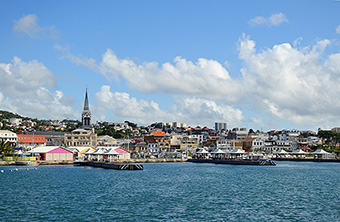A unique exchange programme between two Caribbean-based universities is providing local students with the animation, special effects, and 3D skills they need to compete on the global stage.
- 15 July 2019
This project allows young French West-Indians and Trinidadians to experience enriching regional mobility, to be compounded with different, multilingual learning, and to work in a different sociocultural field.
The animation, special effects, and 3D industry is experiencing tremendous growth and proving to be an economic niche with exponential growth. While there are a few professionals from the Caribbean working in world-renowned animation studios and participating in large production initiatives, at local level the opportunities remain limited.
The export potential in these areas represent real opportunities for Antillo-Guyanese and Caribbean youth. The challenge is providing them with high-quality, local training. Here, the EU-funded Caribbean Animation Project (CAP 3D) is developing a unique university exchange programme that enables students to benefit from the expertise and resources of some of the industry’s leading players.
A successful pilot programme
The project is a joint initiative of PARALLEL 14, the first Caribbean-based, privately run school in digital special effects, 3D animation, and video game creation; and the University of Trinidad and Tobago (UTT). By having students and staff spend a semester abroad at the other school, Cap 3D aims to facilitate the transmission of knowledge and academic links in a French-English linguistic context for both students and staff.
During the pilot phase in 2018, two students from PARALLEL 14 spent a trimester at UTT, while two students from UTT studied at PARALLEL 14. But project coordinators say this is just the beginning of what will become a lasting partnership between the two schools. The project is currently strengthening the available training courses, implementing reciprocal recognition of credits earned at the partner institution, and laying the groundwork for integrated studies and joint diplomas.
The hoped-for end result is a thriving animation, 3D, and special-effects sector in the Caribbean, one backed by a pool of talent from which large international production studios can recruit.
A cultural component
Not only does the project promote the development of important professional skills, it serves an important cultural function. For example, the French speaking PARALLEL 14 students get a chance to practice or learn English on an English-speaking island, while UTT students get to discover French culture and language in places like Martinique. Project organisers say this unique exchange of skills, know-how, and culture helps prepare young graduates to access – and contribute to – European markets.
Total investment and EU funding
Total investment for the project “CAP 3D - Caribbean Animation Project – Parallel 14 and the University of Trinidad and Tobago Academic Exchanges” is EUR 211 053, with the EU’s European Regional Development Fund contributing EUR 112 513 through the “Caribbean Area” Operational Programme for the 2014-2020 programming period. The investment falls under the priority “Strengthening human capital by developing education in Caribbean languages (English, Spanish and French) and student and professional mobility within the Caribbean”.

